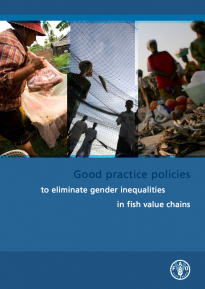Equitable Social and Gender Environment for On-board Handling in Large Scale Fisheries
The quality of fish after harvest also has important implications for food loss and waste (FLW) and value throughout the remainder of the value chain. Around the world, men overwhelmingly perform the dangerous work of hauling in the catch at sea. Value chains, however, also include processors and marketers of seafood and workers many of whom are women. Large scale vessels supply fish to many developed country value chains that include post harvest activities undertaken by women such as processing and trading. Hence, what happens on board such vessels in terms of handling and hygiene will have implications for the livelihoods of both men and women further down the value chain.
Key Publications
Good Practice Policies to Eliminate Gender Inequities in Fish Value Chains This FAO publication highlights key gender inequalities in fisheries and aquaculture value chains that lead to underperformance by women, and proposes good practice policies that can lead to increases in production and processing of high-quality fish. | |
Women Do Fish: A Case Study on Gender and the Fishing Industry in Sierra Leone Examines the varied situation of women in fisheries in Sierra Leone. Their major concerns are access to better markets and credit. | |
Not Just a Boys' Club: Women Hooking into Fishing Industry Examples of women working in the fishing sector. |
More Resources
More Resources
31 October 2023














